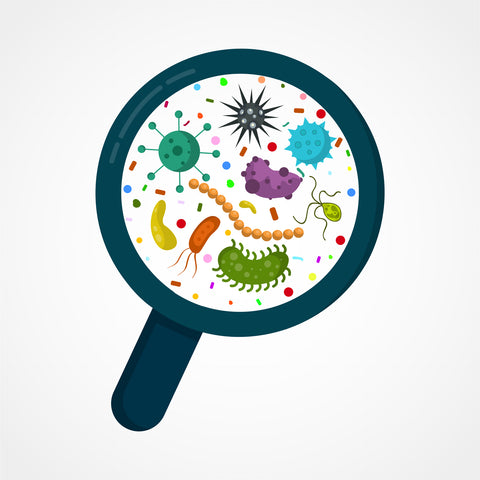Can Your Microbiome Predict Your Mortality? The Link Between Certain Gut Bacteria and Risk of Death

From Antonie van Leeuwenhoek’s first microscopic viewings of bacteria in the 1670s to Louis Pasteur’s ‘germ theory’ and subsequent development of pasteurization in the 1860s, many of the earliest microbiology masters viewed bacteria primarily as disruptive and disease-causing. Although our knowledge of bacteria has evolved immensely since then, only in the past two decades have we truly begun to understand how much microbes play a role in our health — both in helpful and harmful ways.
Coined as the microbiome in 2001, the collection of 100 trillion bacteria that reside in our gastrointestinal tracts are now known to influence much more than just our digestion. From autoimmunity to ADHD to arthritis, a dysregulated microbiome has been linked to dozens of health conditions. Despite the wealth of research on gut bacteria and disease states, relatively few studies have looked at how these microbes affect mortality — especially with long-term follow-up periods.
In a recent study published in Nature Communications, Salosensaari and colleagues undergo the largest and longest study on the microbiome and mortality to date, looking at over 7,000 adults over a 15-year period. The primarily Finland-based research team shows a strong link between certain gut bacteria and the risk of mortality, providing evidence for the use of microbiome testing to predict mortality — and, perhaps, a starting point for altering gut microbe populations to reduce this risk and extend lifespan. As the corresponding author, Dr. Teemu Niiranen, states, “The data used in this research make it possible for the first time to study the long-term health impact of the human gut microbiota on a population level."
Mapping Out the Microbiome
In this study, the research team took stool samples from a group of 50-year-old Finnish adults and followed the cohort for 15 years, during which 10% of the study participants passed away. From these stool samples, billions of DNA strands were retrieved and classified into different microbial signatures. As one of the authors, Leo Lahti, describes their process, "We developed a machine learning algorithm that screened the data for microbial species having a significant association with mortality among the research subjects in the following two decades after the sample was taken.”
This algorithm used a method called principal component analysis (PCA), which can uncover broad associations and patterns of gut bacteria variations and health and environmental factors. Within the PCA results, the researchers identified different patterns of bacterial abundance, with the group called ‘PC3’ being most strongly linked to increased mortality. From these bacterial patterns, the research team was able to pinpoint the gut microbiome characteristics of PC3 that led to increased mortality risk.

Gut Dysbiosis Increases the Risk of Mortality
From this compilation of microbial data, one family of bacteria stood out for their abundance in the mortality-related PC3 group: Enterobacteriaceae — a large family that comprises over 30 genera and 100 species, including the well-known E.coli and Salmonella. Although this bacterial family is found in a normal microbiome, they typically represent only 1% of a healthy gut. Therefore, an overabundance of Enterobacteriaceae is a hallmark of microbial imbalance known as “dysbiosis” that can drive disease and infection — and now, this research adds mortality to the list.
Previous research has found that people with high amounts of Enterobacteriaceae in their guts are more likely to have inflammatory bowel disease, obesity, and colorectal cancer, underlying this bacteria’s role in harming intestinal health. It’s likely that inflammation is a driver of Enterobacteriaceae overgrowth, as people with high amounts of inflammatory markers in the body tend to have disrupted gut microbiomes.
In this study, those with microbiomes that were highest-ranked in the PC3 group had a 49% increased risk of all-cause mortality, which correlated more strongly with death than other health markers, including high blood pressure — a leading risk factor for cardiovascular-related mortality.
Similarly, those with the greatest amount of Enterobacteriaceae in their guts had a 34% increased risk of death, compared to people with the lowest abundance of this bacterial family. Those with increased Enterobacteriaceae were also more likely to die from respiratory or gastrointestinal disorders and had an increased risk of liver disease.

Manipulating the Microbiome to Minimize Mortality Risk
With these results, Salosensaari and colleagues show that microbiome mapping may be a valuable method for determining disease and mortality risk over time, and underlie the importance of maintaining a healthy gut microbial makeup. As summarized by the authors, “Our findings advance current research by demonstrating a particularly strong link between members of the Enterobacteriaceae family and death from gastrointestinal and respiratory causes in a general population cohort study setting with long-term follow-up.”
As this study finds an abundance of Enterobacteriaceae markedly increases the risk of mortality, you may be wondering how to manage your gut microbiome to reduce this risk and extend lifespan. One of the quickest ways to alter your microbial makeup — for better or for worse — is through diet. While high amounts of sugar, alcohol, and inflammatory processed foods are known to be detrimental to our gut bugs, daily intake of fiber-rich, fermented, plant-based, and antioxidant-rich foods have been found to be beneficial to our bacteria. As Dr. Niiranen summarizes, "Our lifestyle choices can have an impact on their amount in the gut. By studying the composition of the gut microbiota, we could improve mortality prediction, even while taking into account other relevant risk factors, such as smoking and obesity.”
References:
Salosensaari A, Laitinen V, Havulinna AS, et al. Taxonomic signatures of cause-specific mortality risk in human gut microbiome. Nat Commun. 2021;12(1):2671. Published 2021 May 11. doi:10.1038/s41467-021-22962-y
Sassone-Corsi M, Nuccio SP, Liu H, et al. Microcins mediate competition among Enterobacteriaceae in the inflamed gut. Nature. 2016;540(7632):280-283. doi:10.1038/nature20557







